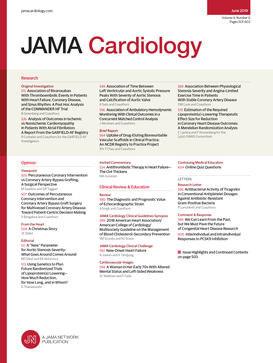术前使用肾素-血管紧张素系统抑制剂的心血管风险和术后结果:一项随机临床试验的二次分析
IF 14.1
1区 医学
Q1 CARDIAC & CARDIOVASCULAR SYSTEMS
引用次数: 0
摘要
这项停止或不停止的随机临床试验比较了在重大非心脏手术前继续使用肾素-血管紧张素系统抑制剂(RASi)和停止使用肾素-血管紧张素系统抑制剂(RASi)的结果,发现术后死亡或主要并发症的风险没有差异,但尚不清楚术前心血管风险分层是否影响对这种干预的反应。本事后分析探讨术前心血管风险分层是否会影响在大手术前继续或停止使用RASi的患者的预后。目的评价术前心血管危险分层对重大非心脏手术前RASi处理策略的影响。设计、环境和参与者这是对2018年1月至2023年4月期间在法国40家医院进行的多中心停止或不停止随机临床试验的事后分析,术后随访28天。数据分析时间为2024年9月至2025年1月。参与者是接受RASi治疗至少3个月并计划进行重大非心脏手术的患者。干预患者被随机分为两组,一组继续RASi治疗至手术当天,另一组在手术前48小时停止RASi治疗。主要结局和测量主要结局是全因死亡率和主要术后并发症的综合结果。次要结局是主要不良心血管事件和急性肾损伤。采用修订心脏风险指数(RCRI)、贝鲁特美国大学(AUB)-HAS2心血管风险指数和随机分组前的收缩压对心血管风险分层进行评估。结果2222例患者(中位[IQR]年龄为68[61-73]岁;771例(35%)女性),1107例随机分配到RASi继续组,1115例随机分配到RASi停药组。使用RCRI, 592例患者被分类为低风险(0分),1095例为中低风险(1分),418例为中高风险(2分),117例为高风险(≥3分)。采用AUB-HAS2心脏风险指数,1049例患者为低危(0分),727例为中危(1分),333例为中危(2分),113例为高危(≥3分)。2132例患者术前收缩压分为4个四分位数。术后并发症和主要心血管不良事件的风险随RCRI评分的不同而不同。然而,继续或停止RASi的策略与术后并发症的高风险无关。本研究发现,在重大非心脏手术前继续或停止RASi的策略方面,术前心血管风险不影响患者的预后,这表明继续或停止RASi的决定不应受到患者术前心血管风险评估的影响。临床试验注册号:NCT03374449。本文章由计算机程序翻译,如有差异,请以英文原文为准。
Preoperative Cardiovascular Risk and Postoperative Outcomes by Renin-Angiotensin System Inhibitor Use: A Secondary Analysis of a Randomized Clinical Trial.
Importance
The STOP-or-NOT randomized clinical trial compared the outcomes of continuing vs discontinuing renin-angiotensin system inhibitors (RASi) prior to major noncardiac surgery and found no difference in the postoperative risk of death or major complications, but it remains unclear whether preoperative cardiovascular risk stratification influences the response to this intervention. This post hoc analysis explores whether preoperative cardiovascular risk stratification affects the outcomes in patients who continue vs discontinue RASi use before major surgery.
Objective
To evaluate whether preoperative cardiovascular risk stratification affects the strategy of RASi management before major noncardiac surgery.
Design, Setting, and Participants
This is a post hoc analysis of the multicenter STOP-or-NOT randomized clinical trial, conducted across 40 hospitals in France between January 2018 and April 2023, with follow-up for 28 days postoperatively. Data analysis was performed from September 2024 to January 2025. The participants were patients who had been treated with RASi for at least 3 months and were scheduled for major noncardiac surgery.
Intervention
Patients were randomized to either continue RASi until the day of surgery or to discontinue RASi 48 hours prior to surgery.
Main Outcomes and Measures
The primary outcome was a composite of all-cause mortality and major postoperative complications. Secondary outcomes were major adverse cardiovascular events and acute kidney injury. Cardiovascular risk stratification was assessed with the Revised Cardiac Risk Index (RCRI), American University of Beirut (AUB)-HAS2 Cardiovascular Risk Index, and systolic blood pressure prior to randomization.
Results
Among the 2222 patients (median [IQR] age, 68 [61-73] years; 771 [35%] female), 1107 were randomized to RASi continuation and 1115 were randomized to RASi discontinuation. Using the RCRI, 592 patients were categorized as low risk (0 points), 1095 as intermediate-low risk (1 point), 418 as intermediate-high risk (2 points), and 117 as high risk (≥3 points). Using the AUB-HAS2 Cardiac Risk Index, 1049 patients were categorized as low risk (0 points), 727 as intermediate-low risk (1 point), 333 as intermediate-high risk (2 points), and 113 as high risk (≥3 points). A total of 2132 patients were split into 4 quartiles of preoperative systolic blood pressure. The risk of postoperative complications and major adverse cardiovascular events varied with RCRI score. However, a strategy of RASi continuation vs discontinuation was not associated with a higher risk of postoperative complications.
Conclusions
This study found that preoperative cardiovascular risk did not affect patient outcomes with respect to the strategy of continuing vs discontinuing RASi before major noncardiac surgery, suggesting that the decision to continue or discontinue RASi should not be influenced by a patient's preoperative cardiovascular risk assessment.
Trial Registration
ClinicalTrials.gov Identifier: NCT03374449.
求助全文
通过发布文献求助,成功后即可免费获取论文全文。
去求助
来源期刊

JAMA cardiology
Medicine-Cardiology and Cardiovascular Medicine
CiteScore
45.80
自引率
1.70%
发文量
264
期刊介绍:
JAMA Cardiology, an international peer-reviewed journal, serves as the premier publication for clinical investigators, clinicians, and trainees in cardiovascular medicine worldwide. As a member of the JAMA Network, it aligns with a consortium of peer-reviewed general medical and specialty publications.
Published online weekly, every Wednesday, and in 12 print/online issues annually, JAMA Cardiology attracts over 4.3 million annual article views and downloads. Research articles become freely accessible online 12 months post-publication without any author fees. Moreover, the online version is readily accessible to institutions in developing countries through the World Health Organization's HINARI program.
Positioned at the intersection of clinical investigation, actionable clinical science, and clinical practice, JAMA Cardiology prioritizes traditional and evolving cardiovascular medicine, alongside evidence-based health policy. It places particular emphasis on health equity, especially when grounded in original science, as a top editorial priority.
 求助内容:
求助内容: 应助结果提醒方式:
应助结果提醒方式:


